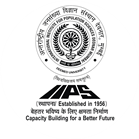- About IIPS
- Academics
- Study @ IIPS
- Departments
- Centres
- Controller of Examination
- Programme
- Distance and Online Education
- Training
- Facilities/Services
- Resources
- Virtual Learning
- Digital Initiatives (MHRD)
- Notice
- Seminars / Workshops / Conferences
- Conferences
- Publications
- Seminars
- Sponsored Research
- Workshops
- Collaboration
- National
- International
- NEP 2020
- Admission
- Courses
- Admission Bulletin
- TIME-TABLE For Admission 2025-26
- Model Question Papers
- Programme Coordinators
- Fellowships
- Academic Calendar
- International Students
- Visa Information
- Administration
- Faculty & Staff
- Research & Publications
- Library
- Information
- Right to Information
- Vigilance Officer
- Annual Report
- Director's Report
- Cells & Commitees
- Cells
- Commitees
- Committees of NEP 2020
- Staff Walfare Committee
- Cultural Committee
- Internal Committee
- Purchase Commitee
- Students Academic Committee
- Student Research Ethics Committee
- Anti-Ragging Committee
- Institutional Review Board
- Social Media Committee
- Prevention of Caste-based Discrimination Committee
- Code of Conduct and Professional Ethics
- National and International honours, Awards, Recognition, and Medals
- Online Facilities
- Employee's Corner
- Memorial Lectures
- Convocation
- IIPS Newsletters
- COVID 19 Information
- Life @ IIPS
Adverse Self-Rated Health Transition Among Older Adults in India: A Retrospective Life Course Approach
- Home
- Adverse Self-Rated Health Transition Among Older Adults in India: A Retrospective Life Course Approach
Abstract Content (not more than 300 word, should include: Introduction, Objective, Methodology, critical findings & Conclusion):
Self-rated health (SRH) is a key indicator of overall health. In India, evidence on the predictors of SRH among older adults is substantial using cross-sectional study approach, but no studies contextualized the patterns and predictors of SRH transition from childhood to older-adults using retrospective life course approach. This study fills that gap by examining the transition in SRH from childhood to later life. Using data from 70,780 individuals aged 45+ from the Longitudinal Aging Study in India (LASI), we examined adverse SRH—defined as a shift from good childhood health to poor/fair health in later life. Descriptive, bivariate, and multivariable logistic regression analyses were conducted. Adverse SRH prevalence was 51%. Higher odds were observed among females (AOR: 1.30), individuals with substance use (AOR: 1.24), multimorbidity (AOR: 3.37), functional limitations (AOR: 2.03), and depression (AOR: 1.51). Childhood poverty, early marriage, and child labor were associated with increased risk, whereas higher education, urban residence, and engagement in social and physical activities were protective against adverse SRH. Life-course adverse transition in SRH is observed to be a critical public health concern. Addressing early-life disadvantages such as child marriage and child labor, and promoting healthy aging through early non-communicable diseases (NCDs) screening—along with promoting social and physical activities—is essential for maintaining good health from childhood to older adulthood.
Abstract theme:
In case of not been selected for oral presentation, do you want to be considered for the poster presentation ?:
Yes
Do you require financial support to attend the seminar ? (Not applicable for virtual meet):
Yes-full
Gender:
Male
Evaluation Status:
No
